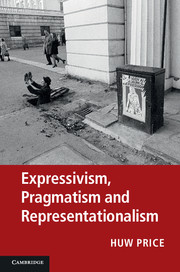Book contents
- Frontmatter
- Dedication
- Contents
- Notes on contributors
- Preface
- PART I THE DESCARTES LECTURES 2008
- PART II COMMENTARIES
- 4 Pragmatism: all or some?
- 5 Global anti-representationalism?
- 6 Naturalism, deflationism and the relative priority of language and metaphysics
- 7 How pragmatists can be local expressivists
- PART III POSTSCRIPT AND REPLIES
- Bibliography
- Index
6 - Naturalism, deflationism and the relative priority of language and metaphysics
Published online by Cambridge University Press: 05 July 2013
- Frontmatter
- Dedication
- Contents
- Notes on contributors
- Preface
- PART I THE DESCARTES LECTURES 2008
- PART II COMMENTARIES
- 4 Pragmatism: all or some?
- 5 Global anti-representationalism?
- 6 Naturalism, deflationism and the relative priority of language and metaphysics
- 7 How pragmatists can be local expressivists
- PART III POSTSCRIPT AND REPLIES
- Bibliography
- Index
Summary
INTRODUCTION
As its title suggests, the topic of this paper lies at the intersection of three central debates within philosophy.
One of them is the clash between truth-based approaches to empirical semantics (which form the mainstream) and a less popular use-theoretic point of view, variously known as ‘inferentialism’, ‘expressivism’ and ‘semantic deflationism’. The issue here, in a nutshell, is whether the word- world relation of reference and the derived property of truth are to be given central roles in characterising the nature of meaning and hence in explaining the import of understanding for verbal behaviour. Perhaps it should be acknowledged, rather, that the concepts of truth and reference are exhausted by trivial equivalence schemata that imply their unsuitability for causal-explanatory work (but enable them nonetheless to serve as useful expressive devices). And if so then, in so far as word meanings exert a causal influence on linguistic activity, their grasp will have to be constituted in some non-referential way – e.g., by basic propensities of word usage.
Second, we have the issue of naturalism. There is undeniably a vast, unified network of objects, properties and facts that bear spatial, temporal, causal and explanatory relations to one another – a network incorporating observable phenomena, the elementary particles, fields, strings, etc., of physics for which those phenomena provide evidence, and all the macroscopic objects and events built out of such elements. But is everything located within this network, as naturalism dictates?
- Type
- Chapter
- Information
- Expressivism, Pragmatism and Representationalism , pp. 112 - 127Publisher: Cambridge University PressPrint publication year: 2013
- 2
- Cited by



